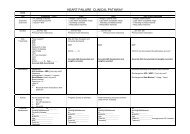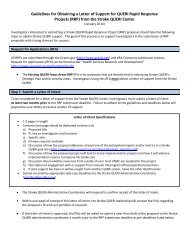The Veteran Supported Education Service Treatment Manual: VetSEd
The Veteran Supported Education Service Treatment Manual: VetSEd
The Veteran Supported Education Service Treatment Manual: VetSEd
Create successful ePaper yourself
Turn your PDF publications into a flip-book with our unique Google optimized e-Paper software.
would be a good note to co-sign with the therapist. Encourage the other members of the<br />
<strong>Veteran</strong>‘s treatment team to co-sign you on notes when the <strong>Veteran</strong> mentions school or<br />
anything that might impact the <strong>Veteran</strong>‘s vocational goals or school performance.<br />
Follow-up phone calls and encrypted e-mails to the <strong>Veteran</strong>‘s other providers about<br />
shared concerns or issues the <strong>Veteran</strong> is experiencing may also be useful in maintaining<br />
ongoing communication.<br />
<strong>The</strong> next step to integrating with clinicians is to attend VHA hospital team meetings that<br />
focus on the needs of OIF/OEF/OND clients. Coordinate with the chairperson of this<br />
meeting so that you have an opportunity to ask about people on your caseload, to provide<br />
a brief update on any important issues, and to arrange for individual meetings with<br />
clinicians, as needed. This is also a good place to discuss, in advance, new referrals the<br />
team is thinking of making and related issues.<br />
Exercise<br />
Take two minutes to role play a presentation to a clinical team. <strong>The</strong> <strong>Veteran</strong> you serve is<br />
feeling anxious about school and is worried that it may be too stressful. You want some<br />
input from the team on handling his/her worry and you also do not want the team to<br />
encourage the <strong>Veteran</strong> to change his/her goal.<br />
What information do you need to share with the team to start this conversation?<br />
What questions do you have for the team?<br />
How do you communicate your concern of the <strong>Veteran</strong> changing his/her goal due to the<br />
worry about stress?<br />
D. Engaging Key People/<strong>The</strong> <strong>Veteran</strong>’s Social Support Network<br />
<strong>The</strong> <strong>Veteran</strong>‘s social support network can be very important in assisting the <strong>Veteran</strong> to<br />
successfully identify and pursue an educational goal. Some <strong>Veteran</strong>s may have a variety<br />
of friends and family members available for support and others may no longer have the<br />
same closeness they had before leaving for active duty. In any case, it is important for<br />
the peer <strong>VetSEd</strong> provider to identify people who can support the <strong>Veteran</strong>, both<br />
emotionally (providing encouragement, someone to bounce ideas off of, someone to<br />
listen to, celebrate successes and share struggles), as well as practically (providing<br />
transportation occasionally, childcare, a part time job, time to study, etc.)<br />
77 | P a g e
















